These are writers whose books I've sought out and devoured over many decades (in some cases having read everything they’ve written). Originally added as I read them, but now ordered alphabetically by surname. Not many British writers focus on the short story form, hence the international flavour. Author sites aren’t always available, and links to other resources like interviews or articles are also provided. I recently discovered that three of them have publicly reflected peaceful anarchist principles, a desirable ideal I think is impossible until humanity matures… if we ever do.
- Jorge Luis Borges
-

(1899-1986) Labyrinths and unfathomable occult libraries. He was blind by the age of 55 from an inherited an eye condition, and between1939 and 1949 he wrote and published practically all the fiction for which he would become famous.
—Is Borges the 20th Century’s most important writer?.Today one could consider Borges the most important writer of the 20th Century…
(Suzanne Jill Levine, quoted in the fascinating article linked above).I have always imagined that Paradise will be a kind of library.
“I saw a small iridescent sphere of almost unbearable brilliance. At first I thought it was revolving; then I realised that this movement was an illusion created by the dizzying world it bounded. The Aleph’s diameter was probably little more than an inch, but all space was there, actual and undiminished.
His essays read like stories, his stories are poems; and his poems make us think, as though they were essays
—Octavio Paz. Multi-lingual and with an eclectic intelligence, Borges was one of the handful of Latin American writers who became known as magic realists in the 1980s. As an foundational postmodernist, he created a new anddynamic, electric genre
that set up entire approach to fiction—“Borgesian” no stands alongside “Kafkaesque”. His collection of short stories Ficciones, wassimultaneously published in six different countries
(Poetry Foundation), and his range of short, concise writings attracted me to his work. Also see the biography on Borges by Roy Johnson. - Italo Calvino
-
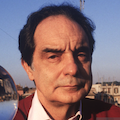
(1923-1985) The universe is the mirror in which we can contemplate only what we have learned to know in ourselves
. Apart from his fiction, I used to read his 1956 collection of Italian Folk Tales as bedtime stories for my two daughters, but regard his thinking and novels highly, including the lectures adapted for Six Memos for the Next Millennium.Don't be amazed if you see my eyes always wandering. In fact, this is my way of reading, and it is only in this way that reading proves fruitful to me. If a book truly interests me, I cannot follow it for more than a few lines before my mind, having seized on a thought that the text suggests to it, or a feeling, or a question, or an image, goes off on a tangent and springs from thought to thought, from image to image, in an itinerary of reasonings and fantasies that I feel the need to pursue to the end, moving away from the book until I have lost sight of it.
All links I once added here have died (what is wrong with website maintainers and why aren’t good pages archived properly?). Anyway, here’s a fascinating interview with Calvino by his translator William Weaver instead. - Leonora Carrington
-
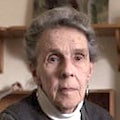
(1917-2011) The task of the right eye is to peer into the telescope, while the left eye peers into the microscope. Described by Dali as the most important female artist, the late Leonora Carrington (brief biography) was an English writer and painter living in Mexico, her early life wrapped up in the Surrealist movement.It is impossible to understand how millions and millions of people all obey a sickly collection of gentlemen that call themselves ‘Government’! The word, I expect, frightens people. It is a form of planetary hypnosis, and very unhealthy. ―Leonora Carrington, The Hearing Trumpet
I became fascinated by her many short stories, then discovered that she has a living relative in my home town. Down Below, the account of her own mental breakdown, is her most well-known story. The website about surrealist writers (headed with Borges’ quotethe universe… which others call the library
) has gone (sigh) but there’s a full biography here. Read The Debutante which features a hyena (as in her famous self-portrait Inn of the Dawn Horse)… you'll either love it or hate it. - Raymond Carver
-
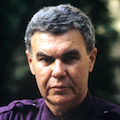
(1938-1988) At 17, Carver took a correspondence course on the “Essential Elements of a Short Story and How to Develop Them.” Seems he mastered this art during his lifetine, and hos wonderful style in the genre captivated me. He hung the completion certificate on his bedroom wall.Carver has not been a minimalist but a precisionist
- David Lipsky, National Review (USA) (5.8.1988);the strangeness concealed behind the banal … the individuality that survives mass-produced goods and look-alike lifestyles … a poetry out of the prosaic
- Peter Kemp,The American Chekhov
, London Times (quoted by Carver biographer William L. Stull).How far in this world are you going to get writing short stories?
The late Raymond Carver is arguably one of the most important 20th century American writers of poetry and short stories. I love his observational style and almost laconic descriptions of human realism, which come across as free from any cynicism, which you might expect when reading about his own life. His first book of short stories Will You Please Be Quiet, Please? was published in 1974. - Susanna Clark
-

(1959-) Her her first novel, Jonathan Strange & Mr Norrell (made into a film) gained much acclaim and placed a formerly marginalised genre into the literary mainstream with its depth of research, skill and intelligence. Jane Austen meets Jorge Luis Borges while researching the folklore documented by Katharine Briggs, sort of…you make magic real by making it a little prosaic, a little difficult and disappointing
There’s a good article on the British Council website that describes her as a fantastical postmodernist a label that seems to me to diminish rather than enhance her style; but the termSpeculative Fiction
is now in vogue. Before this, my term was fantastical realist, because the atmosphere of her writing evokes a new form of magic realism. See her interview with Neil Gaiman - Arthur C. Clarke
-
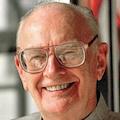
1917-2008 Engineer, futurist, and humanist, Sir Arthur C Clark has probably done more than any other Science Fiction writer to encourage an optimistic and wide-ranging futuristic view of humanity and our relationship with the universe. The film of 2001 brought many to his books, and I was one. He manages to create profoundly mysterious worlds and scenes, and steers far away from tiresome sci-fi clichés.Any sufficiently advanced technology is indistinguishable from magic.
Your society … seems not to understand the fundamental inconsistency between individual freedom and the common welfare. The two must be carefully balanced. No group can survive, let alone thrive, unless what is good for the overall community is more important than individual freedom … How can anyone with any intelligence possibly justify, in terms of the overall community, the accumulation and hoarding of enormous material assets by a few individuals when others do not even have food, clothing and other essentials? —Rama Revealed (1996)
I’ve been waiting decades for the Rama trilogy to be made into a film, but suspect that the time wasn’t quite right, although now there’s a version in the pipeline written by Eric Roth for director Denis Villeneuve. Another era of optimism is required for us to be receptive en-masse to the kind of vision found only in parts of Star Trek (Roddenberry said Clarkliterally made my Star Trek idea possible
), but always present in Clark. - Thomas Hardy
-

(1840-1928) Much more than a romantic, the moralistic Victorian reaction to his 1895 novel Jude the Obscure led him to abandon fiction for poetry, but I enjoyed his novels and short stories best, especially at a time I wanted to be Far From the Madding Crowd myself and despite not at all enjoying having to read The Trumpet Major at school.Eight or nine years ago … I had a neat stock of fixed opinions, but they dropped away one by one; and the further I get the less sure I am. I doubt if I have anything more for my present rule of life than following inclinations which do me and nobody else any harm, and actually give pleasure to those I love best.
For an brief biography, you can’t do much better than this Thomas Hardy author guide on Bibiofreak. - Laura (Riding) Jackson
-
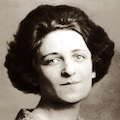
(1928-1991) The Wikipedia page on Laura Riding is a good place to start. There's also the Laura Riding Jackson Foundation, which has a very rich Laura riding resources page. Known for her renunciation of poetry in 1941.More and more the poet has been made to conform to the literature instead of literature to the poet — literature being the name given by criticism to works inspired by or obedient to criticism (from Coldfront Magazine)
The wrong kind of doing is doing that people do not for comfort or fun but in order to prove to themselves and to other people that they are people. Of course, the only kind of people that people of this sort could impress would be people like them, who wished to seem people in a general way although they weren’t particularly speaking people. In a place where most of the people were like this the object of life would be busyness.
This is a good biography. Her Progress of Stories is the short story collection that drew me to her fiction, rather than her poetry. She was also the brains and the muse behind much of Robert Graves’ work. Some of her more intimate writing was aboutto live a life of creativity and integrity, why praise and prestige are corrosive objects of success, and above all what it means to be oneself
, in letters written to Robert Graves’ daughter. - Franz Kafka
-
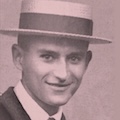
(1823-1924) As a writer who gained his own posthumous adjective, Kafka’s Letters to Felice both captivated me, and confirmed its meaning. Even after reading his other material (similarly captivating) nothing else opened up his private world more than the letters between him and his first fiancée Felice Bauer, though two protracted engagements and break-offs, until 1917. She lived on until 1960 while he, of course, died of tuberculosis in 1924, after struggling with both his health and family obligations for many years while often having to maintain a façade that concealed his actual self. Contrary to his image, he enjoyed humour and even practical jokes.One has either to take people as they are, or leave them as they are. One cannot change them, one can merely disturb their balance. A human being, after all, is not made up of single pieces, from which a single piece can be taken out and replaced by something else.
Each of us has his own way of emerging from the underworld, mine is by writing. That's why the only way I can keep going, if at all, is by writing, not through rest and sleep. I am far more likely to achieve peace of mind through writing than the capacity to write through peace.
The outside world is too small, too clear-cut, too truthful, to contain everything that a person has room for inside.
His wisdom in the face of his own struggles is what comes through, yet it’s also painfully obvious how much of this was—probably unconsciously—self-generated from frustration at himself. His indecision in the face of obligation, with a need to preserve some kind of space around his being through isolation in order to be himself, is a trait to which I think many can relate. The often interminable labyrinths of his psychology are obviously reflected in much of his work. However, apparently hewas was known to laugh uncontrollably when reading his work aloud to friends
(What kind of funny is he?, Riva Galchen) - Milan Kundera
-

(1929-2023) A writer for would-be writers and creatives everywhere… there’s a good (archived, thank you!) New York Times interview with the author from 1984.If I write a love story, and there are three lines about Stalin in that story, people will talk about the three lines and forget the rest, or read the rest for its political implications or as a metaphor for politics.
In the 1980s, Milan Kundera has done for his native Czechoslovakia what Gabriel Garcia Márquez did for Latin America in the 1960s and Solzhenitsyn did for Russia in the 1970s. He has brought Eastern Europe to the attention of the Western reading public, and he has done so with insights that are universal in their appeal.
—Olga Carlisle. Kundera is now—in the light of rabidly anti-socialist times—regarded (by at least one biographer) as controversial for his past role under communist rule, and for some of his private life but his writing really drew me in by making fascinating insights into elements of the human psyche that are present but dormant in many of us. However, I didn’t find his last book that engaging. - Ursula K. Le Guin
-
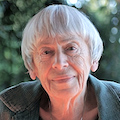
(1929-2018) Her work took fantasy literature further than the genre it was at the time of her writing. The Wizard of Earthsea and The Left Hand of Darkness and subsequent novels lit up science fiction with her unique perspective that reflected on salient contemporary issues and psychological realities. Her lead characters broke the “all white” mould too, subtly, but with confident certainty.We read books to find out who we are. What other people, real or imaginary, do and think and feel... is an essential guide to our understanding of what we ourselves are and may become.
We live in capitalism. Its power seems inescapable. So did the divine right of kings. Any human power can be resisted and changed by human beings. Resistance and change often begin in art, and very often in… the art of words.
Most recently, I really enjoyed the variety of vision in her short story collection The Unreal and the Real. You can watch short videos of her in later life and some interesting podcasts are available too. - Gabriel García Márquez
-
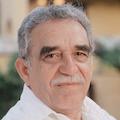
(1927-2014) Magic realism with a human face. Born in Columbia, and one of the key magic realist authors whose work really inspired me in the 1980’s.It always amuses me that the biggest praise for my work comes for the imagination, while the truth is that there's not a single line in all my work that does not have a basis in reality
We called a band I was in Leaf Storm after one of his collections of short stories. Some nice Márquez resources here. - Anne Tyler
-

(1941-) I’ve read all her novels. Another American writer, whose books emerge at two year intervals and celebrate an opposing view to aggressive, ambition-based culture, which is why I like her characters.It seems to me often that I’m sort of looking from a window at something at a great distance and wondering what it is. But I’m not willing to actually go into it. I would rather sit behind the window sill and write about it. So all my curiosity has to be answered within myself…
One of the most deeply human writers I've ever enjoyed.
To follow: Isabel Allende, others, one-off books that made an impact.